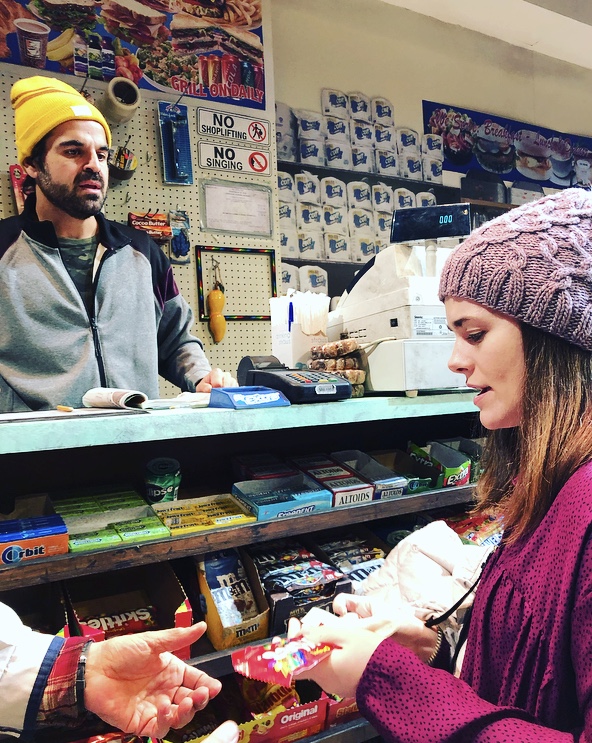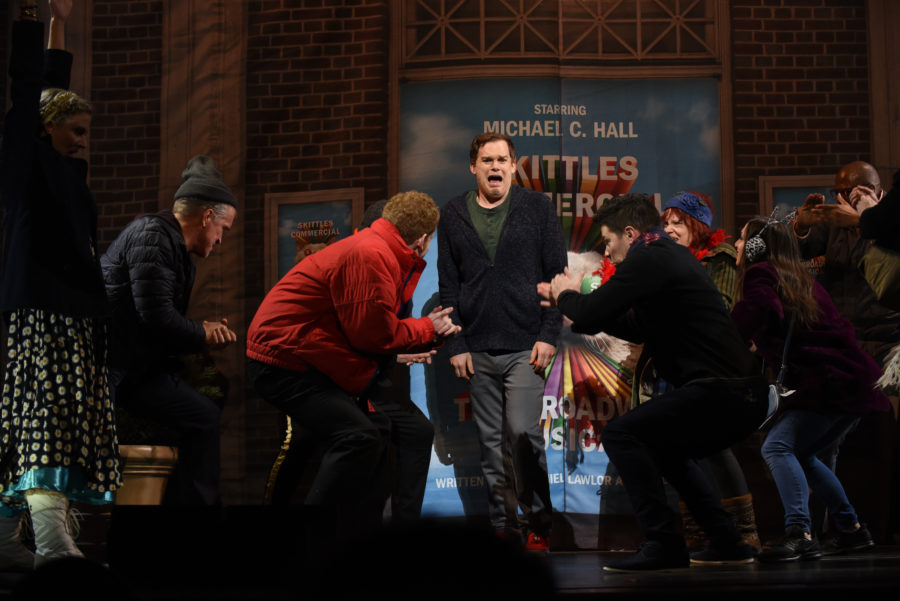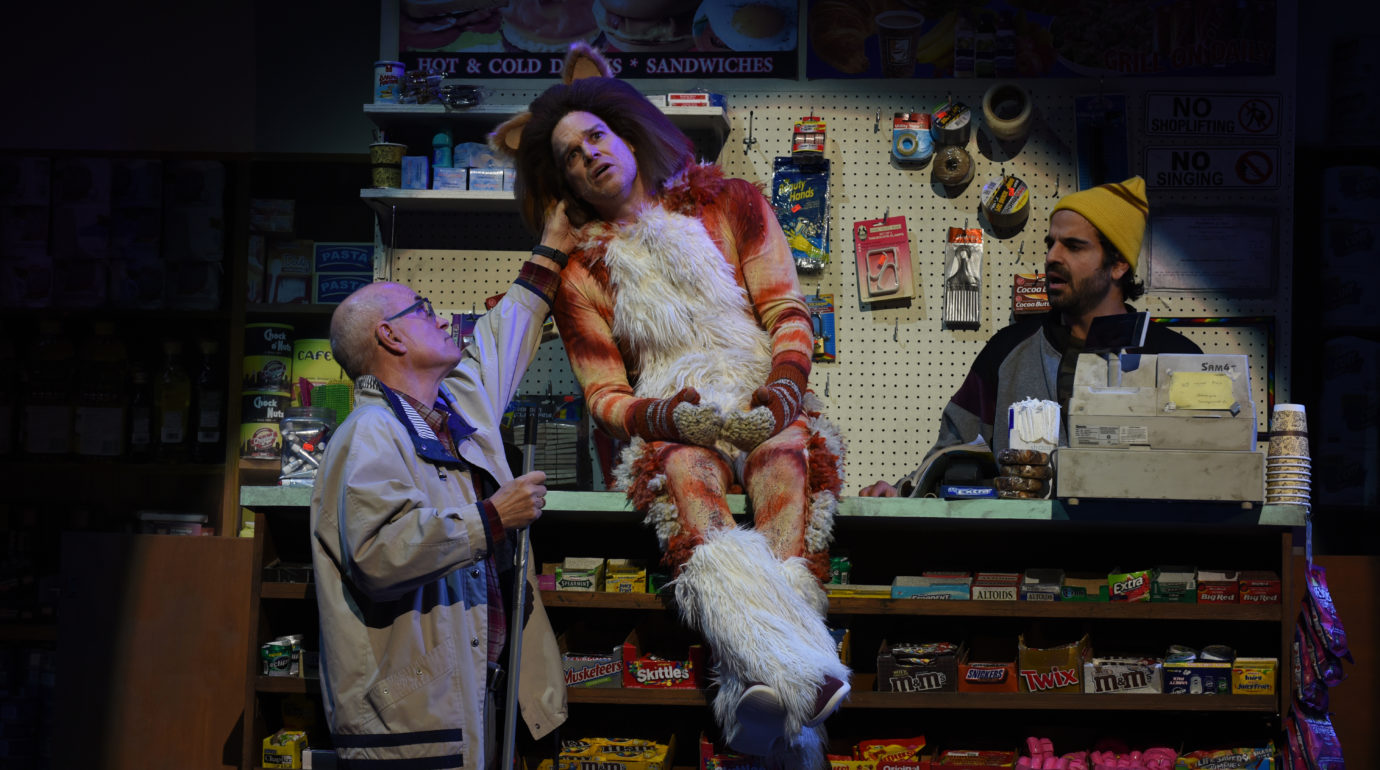“This might have been a bad idea,” sang actor Michael C. Hall near the beginning of Skittles Commercial: The Broadway Musical, which played one performance only on Feb. 3. Bad or good, there it was: The candy giant’s substitute for televising a commercial during the Super Bowl later the same night was an original, 45-minute musical at Town Hall on 43rd Street in Manhattan (not quite “Broadway,” as billed, but close enough).
The script was written by Pulitzer finalist Will Eno, with music and lyrics by Drew Gasparini and Nathanial Lawlor. Obie-winning director Sarah Benson oversaw the production, which included falling set pieces, a confetti cannon, and Hall dressed up as a Jellicle cat (one of show’s many theatre references).
A quick plot summary: The show opened on a bodega where New Yorkers were coming to prep for their Super Bowl parties. In walked Hall, as himself, voicing his doubts about starring in a show called, um, Skittles Commercial (the first of many metatheatrical moments). Hall (the character) was then attacked and killed by an angry mob. The final scene took place in the afterlife, where Hall met Winston Churchill and Amelia Earhart (really), and discovered that Skittles Commercial and his related death helped sell almost 600 packs of the colorful, crunchy confection.
Skittles isn’t the first brand to partner with theatre artists, and they probably won’t be the last. Below, senior editor Diep Tran and associate editor Allison Considine discuss the show via g-chat and what it means for the future of theatre, advertising, and candy consumption.
Diep Tran: First question: Did you taste the rainbow?
Allison Considine: I definitely did taste the rainbow. I’m a Skittles fan. They are definitely in my movie candy rotation. What were your feelings toward Skittles before yesterday?
Tran: I was pretty ambivalent about Skittles. They’re not my go-to candies (that would be sour belts). But feeling pressured by you and other people in the audience, I ate some Skittles yesterday for the first time in 10-plus years. So I guess if their motive was to get people who don’t traditionally eat Skittles to eat Skittles (or in your case, buy Skittles), mission accomplished?

Considine: The way they went about selling the Skittles—which were only $1 a pack, I should add—was very on-brand with the company’s ingenious marketing strategy. Audience members were invited onstage before the show to peruse the shelves of a bodega. There were household items, cat food, snacks, and lots of confections. The only thing anyone could actually buy though, were, of course, Skittles.
Tran: I appreciated the light shade toward M&Ms, which were made to look very dusty.
Considine: Those weren’t for sale (I asked!). I went into the performance ready to buy Skittles, so I appreciated that they made that transaction extra silly. The mantra of the show/commercial is #AdvertisingRuinsEverything. But hearing the songs and following the excitement of Skittles Commercial: The Broadway Musical on social media leading up to the show really worked on me. #AdvertisingSellsSkittles.
Tran: How should we evaluate this show? Do we evaluate it like a piece of theatre, or like a commercial?
Considine: I think there is merit in evaluating the performance-commercial hybrid as a commercial, and separately as a piece of theatre. As a commercial, it was zany and fun, and was successful in selling Skittles. Or at least the Skittles brand.
Tran: I think it achieved what you would want in a Super Bowl commercial, which is funny and meme-able, with a WTF factor (and a celebrity in the center). Too bad they’re not releasing a filmed version; I need gifs of Michael C. Hall dressed as a cat swatting bananas for all of my moods.
Considine: I must say that the songs are real earworms. I often leave performances of new musicals without any tokens from the score, but I’ve been singing “Advertising Ruins Everything” on repeat.
Tran: I think it’s not as simple as trying to get people to buy more Skittles. It was about building brand recognition, and giving people positive associations with the brand, and building buzz on social media. The fact that they got us, two millennials with multiple social media accounts, to come and post multiple photos under the hashtag #SkittlestheMusical #BroadwaytheRainbow, means they got us. We played into the branding by going to the play. And we’re doing what they want by even talking about it now!
It seemed like both a parody of a Broadway show, and a parody of an ad.
Considine: And Skittles even dissed itself with a line stating that candy is indeed bad for you and can ruin your teeth. The show/commercial straddled parody and stark reality. It was very philosophical and surprisingly dark. One of the lines is: “If we live our lives backwards, everything would be an omen.” And Michael C. Hall dies!
Tran: He gets killed by a mob that are angry at advertisers! Which was almost as dark as the Bud Light “Game of Thrones” commercial.

Considine: And his death scene included Skittles pouring out from a vent on the stage and a giant bear slowly crossing the stage. Genius.
Tran: This musical was bonkers. I think we went in expecting it to be a straight commercial and were surprised by how profound it ended up being. What do you think the show was trying to say about consumerism? I found the lyric in “Advertising Ruins Everything,” about how “it shows me how perfect a woman can be, and reminds me how perfect I’m not,” to be surprisingly sad and self-aware.
Considine: This went to a dark place, Diep!
Tran: What’s really morbid is that they sing that song, and then the actors celebrate Skittles selling 600 packs during the show. It’s almost to say that we complain about late-stage capitalism, but at the end of the day we still play into it. Which is not the message I expected to be getting from a show called Skittles Commercial. What did you get thematically?
Considine: Something that was kind of lost in the stage production in this section, that comes across clearer in the cast album, was the nod to Dear Evan Hansen, which I thought was clever. The final song, “This Definitely Was a Bad Idea,” riffs off of “You Will Be Found,” with the same track featuring the ensemble reading about the impact of the Skittles onstage commercial: “Are you guys seeing this? An article in Business Insider says Skittles sold 587 packs at the concessions during the show,” and, “Those 600 packs really give meaning to Michael’s life.” It is really dark to compare the sale of Skittles with suicide. But it goes into the deeper message: The business of selling and buying candy is not life-or-death. But these little spherical bites of sugar kinda make the world a bit brighter, even just temporarily.
Tran: You’re so optimistic!
Considine: The sugar really got to me.
Tran: Skittles did end up donating the ticket sales to Broadway Cares / Equity Fights AIDS. The press rep told me it was over $100,000. So I would say, in today’s landscape of people rewarding companies for being socially conscious, they probably got some new fans.
Considine: There were a lot of artists and corporations boycotting the Big Game this year because of the NFL’s treatment of Colin Kaepernick. Even if they didn’t mean to, I feel that Skittles used this musical commercial to showcase its social justice values.
Tran: That’s a great point. We went to Behind the City together [another collaboration between a theatre company and a corporation], and I remember you telling me that you went to Refinery29’s pop-up show. Do you think theatrical branded content is the future, and what makes it successful? One that gives you Instagram moments?
Considine: I had such a great time at Behind the City. In addition to being part of an interesting, immersive theatre experience I learned about Macallan and even grew to like whiskey over the course of the evening. I spent so much time in line at Refinery29’s “29 Rooms” and could have used some song and dance. All of these pop-up experiences dip their toes in immersive theatre, but it is more about getting pics for the ‘gram. The key will be to mash up these Instagrammable exhibits with performance.
I think that theatrical branded content is the future—and I think I’m okay with that. The photo ops lure in the millennials, and as soon as someone figures out how to add some theatricality to it all there will be a new generation of theatregoers. They’ll come in droves, with their phones and their wallets.
Tran: Watch out, Patti LuPone! I love your optimism about capitalism infecting our artsy, nonprofit world. What I appreciated about Behind the City was the “show” part didn’t talk about Macallan at all. I wonder how artists can maintain a sense of artistry when they’re being pressured by corporations. Will Eno was able to create something surprisingly profound with Skittles Commercial because subversion is his MO, but I highly doubt he would have written that without Skittles money.
Considine: If these mega-monster corporations can subsidize the creation and experience of new shows, I’m okay with that. It works with Skittles because the whole enterprise of creating and staging a commercial is questioned in the content. Michael C. Hall worries about ruining Broadway forever.
Tran: I know many people who bought tickets to Skittles Commercial because they were curious and it seemed out of left field (I think I used that sports analogy correctly). But I wonder if more corporations do these kind of theatrical happenings, will it still be seen as authentic and special, or will it be seen as another cynical marketing tool? I do agree with you that in employing artists, they might be able to give these things some artistic merit, so we get more from these events than “buy Skittles.”
Considine: It is a very fine line. Skittles definitely scored in getting people interested, and got some extra points for it actually being interesting.
Tran: Speaking of branded content on Broadway, did I tell you about when I went to Escape to Margaritaville and they served Jimmy Buffett’s Margaritaville-branded tequila in the lobby? I hope that if this is the future, the shows will be more like Behind the City or Skittles and less like Margaritaville.
Considine: And from a consumer perspective, I did watch the game last night (for the commercials). Nothing scored a commercial touchdown like Skittles.
View this post on Instagram


